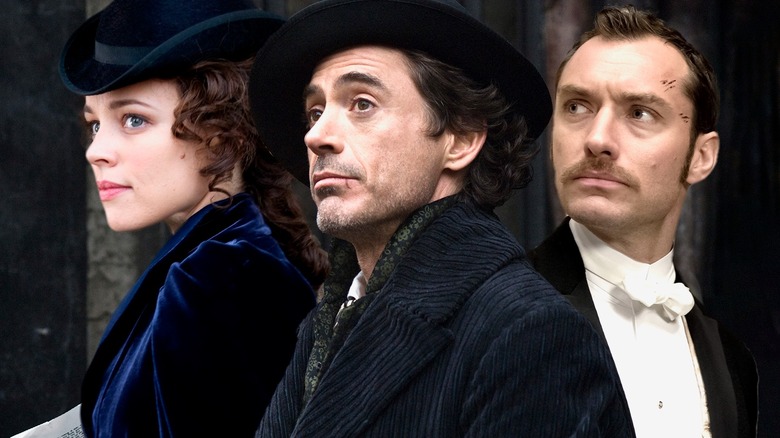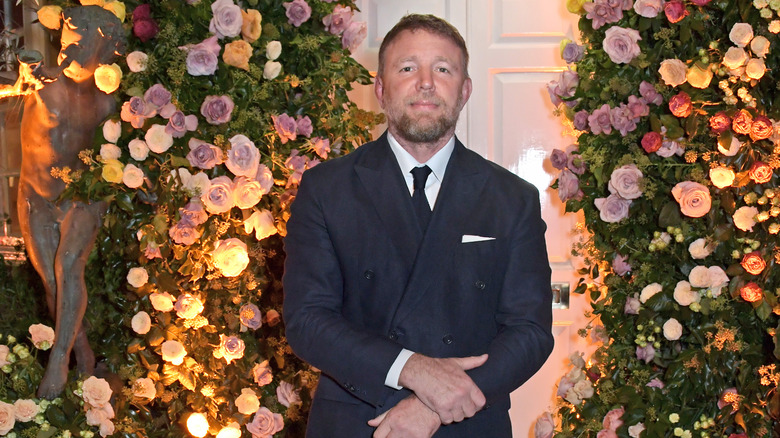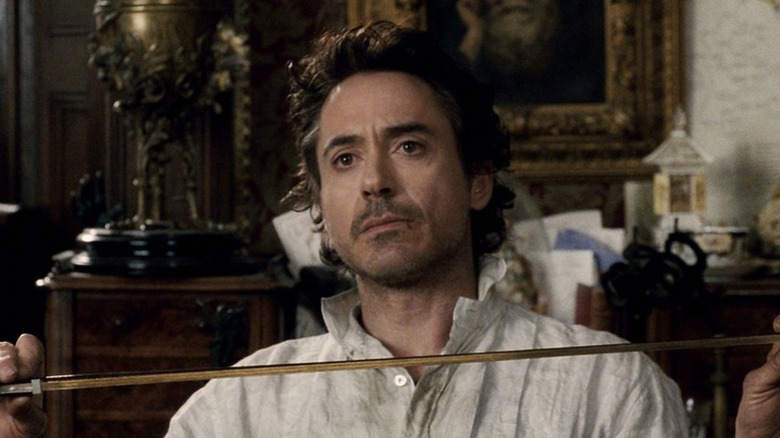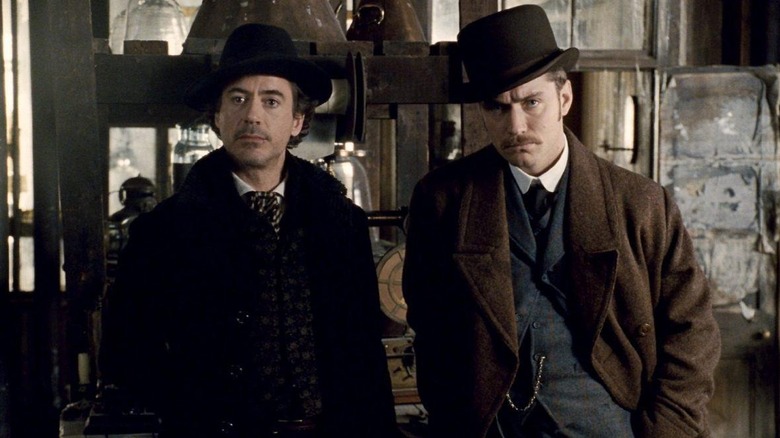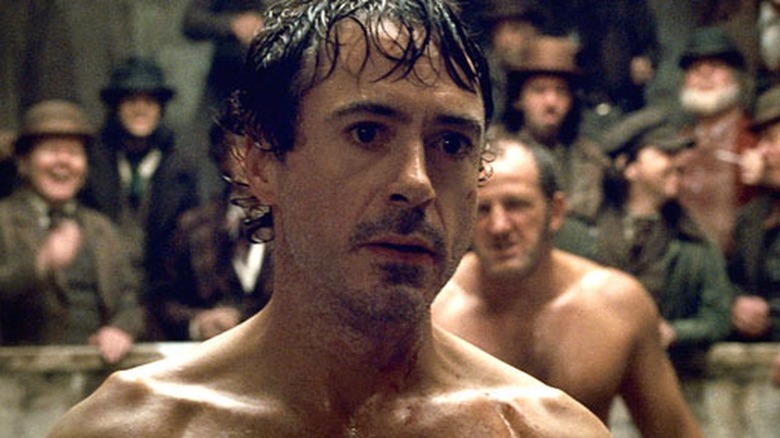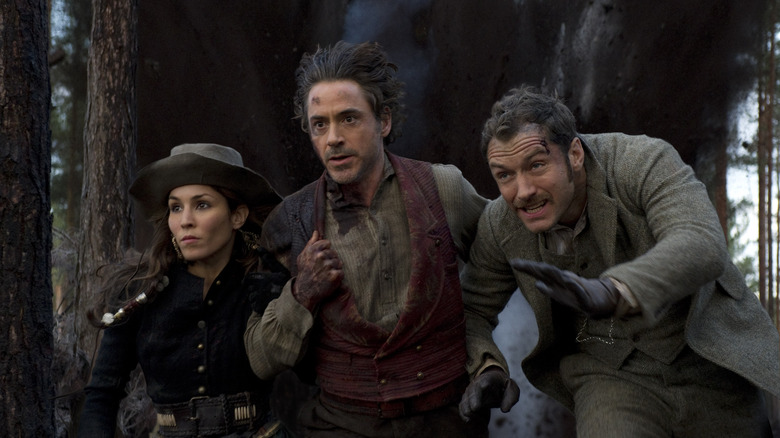Guy Ritchie's Sherlock Holmes Films Are Great, Actually
As his new film, "The Covenant", opens in theaters, there's no better time to remind the doubters that Guy Ritchie's a great filmmaker and his Sherlock Holmes movies are awesome!
With the release of his newest film, Guy Ritchie demands to be taken seriously. How could it not? The British director, best known for Cockney gangster fare, has helmed a war film set in Afghanistan that deals with the trauma of the battlefield and the American military's hypocrisy towards the residents of the land it occupied. All that and he's put his name in the title: "Guy Ritchie's The Covenant." It's all very stern stuff, the kind of thing that's easy to mock. Indeed, Ritchie isn't a director who has necessarily commanded critical adoration over the decades. He's made a lot of money and can easily be counted as one of the most influential British directors of his time.
Yet he's frequently dinged for being too glib about violence, too focused on quips over plot, more concerned with style than substance. To those in the know, however, Ritchie is a stellar director of action-adventure fare who has consistently offered his unique aesthetic amid a sea of Marvel assembly line fare and shaky-cam tedium. At the heart of his back catalog are two films based on one of the most iconic fictional characters of all time. Long before Disney got their hands on him and after Madonna was through, Guy Ritchie breathed new life into one Sherlock Holmes, and the results were his finest efforts as a filmmaker.
Guy Ritchie is a great director, seriously!
Let's get this out of the way: Guy Ritchie is an excellent director. Yes, he's easy to malign and has a few stinkers under his belt — raise a glass to those of us who sat through "Swept Away" — but he's also a remarkably consistent filmmaker with a savvy eye for a striking set-piece and puts to good use witty ensembles of varied acting styles. At his best, he's got his tongue firmly planted between his cheeks, even as he dives head-first into heady worlds of subterfuge, violence, and very dangerous people. The banter undercuts the potential portentousness of his worlds. Even at his worst (and he has some real low moments in his filmography), there are stand-out moments. This is the director who made a Disney live-action remake almost justify its own existence!
What makes Ritchie so intriguing is how he has managed to retain his uniquely Ritchie-esque qualities even as he becomes further embroiled in the Hollywood machine. 2015's "The Man From U.N.C.L.E.", perennially underrated by the world, allowed him to inject a polished yet vibrant energy into a traditional spy action story set-up, and make what could have been a staid, by-the-numbers IP reboot. His "Sherlock Holmes" fit the bill too, feeling distinctly like films made by his own hand and not a committee meeting. That seems like a low bar to cross but such is the reality of modern blockbuster filmmaking. Both "Sherlock Holmes" and its sequel "Sherlock Holmes: A Game of Shadows" (with the latter being the better film) presented opportunities for Ritchie to turn expectations on their head. Who better to take on London's most beloved detective than the guy (no pun intended) that redefined the city for '90s cinema?
Sherlock Holmes is supposed to be fun!
When Ritchie's "Sherlock Holmes" premiered, the world was experiencing something of a Sherlock cultural boom. The detective seemed to be everywhere, most prominently seen in an acclaimed BBC modern-day reimagining, "Sherlock," starring Benedict Cumberbatch and Martin Freeman. It's not as though we were ever short of Holmes adaptations. He's the most adapted human character in the world according to Guinness World Records, ahead of Poirot and Zorro, but behind Count Dracula. Yet the power of these public domain characters lies in how they can be reimagined to embody contemporary ideas and the changes in entertainment. Arthur Conan Doyle infamously didn't care what others did with his creation, which is how we got Sherlocks so wildly varied over the years: from Basil Rathbone's traditional deerstalker hat-wearing gentleman to the nihilistic Dr. House to Disney's dashing mouse Basil. Many people obsess over Sherlock's dazzling intellect, which is certainly the case for the BBC one, to a fault. For Ritchie, he remembered a crucial fact about Conan Doyle's stories: they're supposed to be fun!
The expected tropes of a Holmes story are still here. There's a lot of time dedicated to showing Sherlock's unique methodology, visualized here as a glance into the ideal future of his actions. The mystery is tangled but rooted in reason even as it veers towards the speculative. All of this is presented with a sharp eye and captivating focus, but it's in the pulpy aspects of the Holmes lore where Ritchie's method shines. Conan Doyle's stories weren't supposed to be higher-brow, untouchable tomes for the elite. They were popular entertainment for the masses that encouraged readers to have a rip-roaring time. Many Holmes adaptations seem to forget this aspect, abandoning the thrills in favor of Sherlock's intellectual posturing. Ritchie has no such aspersions, and his Holmes movies are all the better for it. Things blow up, people get punched, and there's true energy to each scene.
Downey Jr. and Law are an excellent Holmes and Watson
At the heart of these films is a duo with spot-on chemistry: Robert Downey Jr. and Jude Law. Back on top of Hollywood thanks to the success of "Iron Man," Downey Jr. didn't seem like a natural fit for Holmes, what with being an American best known for roles of sardonic chaos. Law is a stellar actor known for sleepwalking through the occasional role. Yet together the chemistry is palpable. This Sherlock is like a terrier, half-feral, but his shambolic exterior hides a brain that is always two steps ahead of the game. His genius is often impeded by how much he irritates everyone around him, which makes for some of the best jokes in the series.
It helps that Ritchie has always been good with playful relationships between men, and keenly understands that the best Holmes/Watson dynamics are those that play on their frequent bouts of co-dependency. Downey Jr.'s Sherlock cannot deal with losing his BFF to a woman, and his puppyish petulance feels like that of a jealous ex trying to conceal their envy. It provides some of the film's funniest moments, especially as Law balances his aggravation with genuine affection for Holmes. The series also allows Watson to be an even player in this story. He's not a worshipping stooge of Holmes or a bumbling fool. He's a military man who contributes evenly to his work with Sherlock, and is appreciated for it.
Why Ritchie's take on masculinity works
At the heart of Ritchie's filmography is a study of men, specifically the kinds of masculinity that dominate the culture. His work is full of blokes, tough geezers, the ones who take no s*** and have the bruises to back that up. Yet these men are also, through Ritchie's gaze, inherently ridiculous. These guys are desperately trying to impress one another with their muscles, guns, and street smarts. Typically, that ends with them falling flat on their faces (or with a bullet in their brains.) Their banter is laden with an eagerness to, if we must be blunt, be the biggest c*** in the room. Ritchie endears us to these men but doesn't necessarily want us to root for them. Most of the time, it seems exhausting to be a man in his worlds.
With the "Sherlock Holmes" duology, we see this battle play out with a wink and a nod, particularly in regards to Sherlock, who may be a scrappy fighter and intellectual giant but is also a socially stunted weirdo who doesn't know how to handle basic human politeness. He's regularly taken down a peg not just by Watson but by Watson's fiancé, the iconic Irene Adler, and even his own housekeeper, Mrs. Hudson. This is not a Holmes adaptation where Sherlock arrogantly walks over everyone else he deems to be inferior to his immense intelligence. He's still a man here, and it's perfect, a welcome contrast to other adaptations that seemed a touch too enamored with its protagonist, to the detriment of the story.
Ritchie's action scenes are top-notch
If you're going to do an action-focused Holmes adaptation then your set pieces better be stellar. Fortunately, this is Ritchie's wheelhouse. His action is always kinetic, acutely capturing the movement of fighting and furor. In his video essay for RogerEbert.com, Scout Tafoya detailed how "A Game of Shadows" utilized CG-focused-filmmaking to its most intriguing potential while blending it with practical effects. There's real force behind it all, as bullets splinter trees into oblivion while Holmes and Watson run through a forest for their lives. As Tafoya put it, "The Sherlock Holmes movies deconstruct action sequences, not just to get you into the head of its hero but to illustrate the work that goes into staging and filming them [...] Some of the things that Ritchie and his crack editors dream up in 'Game of Shadows' combine modern and ancient technique to create sequences of such remarkable force and awe that they seem to break open the possibility for entirely new directions in action filmmaking." Crucially, you can always see what's going on in the "Sherlock Holmes" action scenes. Even when the camera shakes, your focus is clear and the narrative cohesive. It's a welcome contrast to the Bayhem-defined overkill that made a hell of a lot of modern blockbusters near-impossible to keep up with.
A third "Sherlock Holmes" film is in the works, but alas, it reportedly won't be directed by Ritchie. His former colleague and "Rocketman" director Dexter Fletcher is attached to the project, which remains in limbo while Downey Jr. and Law work on other things. With no offense intended towards Fletcher, it'll be an inevitable downgrade for Ritchie to step away from the series he made so deeply entertaining. Still, as he veers into more "serious" filmmaking and remains part of the Disney live-action remake machine, at least we'll have two truly perfect historical action films to rewatch at our leisure.
